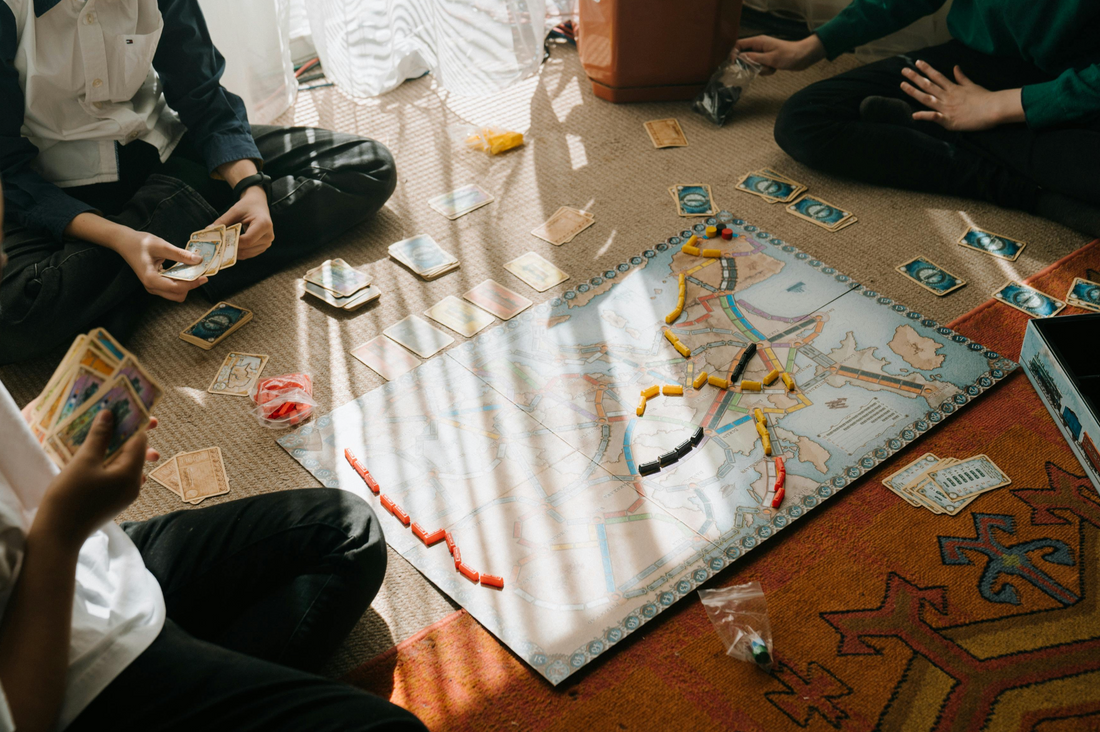Playing board games at Christmas is as traditional as fairy lights and stockings. We look forward with anticipation to long evenings around the table, mulled wine in hand and carols on the radio. But the reality doesn’t always match our glossy, idyllic Christmas vision. Here are some ideas to help bypass the messy explosions, arguments and tears and to help keep family board gaming positive and harmonious this festive season.
Choose the right games.
Not all games are created equal. You may inadvertently launch into a game that brings out the worst in your family. If the children are easily upset, look for cooperative games, where everyone plays together to try to beat the game. Avoid long periods of downtime by picking games with quick turns or simultaneous play. If conflict on the table causes conflict between players, opt instead for games where each player is working on their own score-sheet or tableau. Avoid long games that have a runaway leader or player elimination. Nobody wants to lose for two hours or be out long before the game has finished.
Learn before you teach.
Having to watch while you read a rule book will pretty quickly lose children’s interest in the game, before it even begins. If the family wants to be involved in unboxing, that’s brilliant, but you could then suggest playing it later once you have had time to get to grips with the concepts and components and are able to get through at least a few rounds without needing to consult the rules. When you can give a concise explanation, a new game will get swiftly underway.
Use house rules.
Particularly when playing with younger children, the rules to some games may need tweaking. Longer games that require prolonged concentration can be shortened by changing endgame conditions. Younger players can be given more information or resources at the start, or special powers to ask extra questions. Try differentiating victory conditions by letting younger players achieve a win with fewer points. You can adjust advantages as children become more experienced. Fair is not always equal.
Model the behaviour you want to see.
When other players perform stunning feats of strategy or brilliant tactical moves, make sure you give them your genuine praise and delight. This encourages group celebration of other people’s successes and demonstrates the behaviour that you want to see from your children. Try not to wallow if things don’t go your way, or trumpet your genius if you’re winning. Be cheerful in defeat and humble in victory. While it’s good if everyone plays to win, no one should need to win.
Give advice lightly.
It is a common lament from parents that their children just won’t accept their efforts to teach them. Curiously, this is often because our children really want to impress us, and they don’t want to show weakness or a lack of understanding. So, don’t give advice or help until you are asked. Offer help if you wish, but don’t insist on giving it if your offer is rejected. Encourage your children to make their own decisions. Emphasise that your opinion is just one opinion. Play down your expertise and boost your child’s belief in their own ability. Remind them of times in previous games when they’ve made great decisions or triumphed in difficult circumstances.
No rigged victories.
Don’t be tempted to let your children win. Of course, I don’t mean that children shouldn’t be allowed to win, far from it. I mean that we should not play poorly just to enable our children to win. Children learn from observing other players, so having models of successful gameplay to learn from is essential to building up a strategy. Parents are critical role models. If parents underperform on purpose, that sends a poor message: a broken model. Children excel when expectations are high, so give them that opportunity. And, crucially, remember that if children are always allowed to win, they’ll never be happy if they don’t.
____
Ellie Dix is a board game designer and author of The Board Game Family: Reclaim Your Children from the Screen. She also runs The Dark Imp, a board game publisher specialising in games for families. thedarkimp.com
____
Published in issue 70. Accurate at the time this issue went to print.



